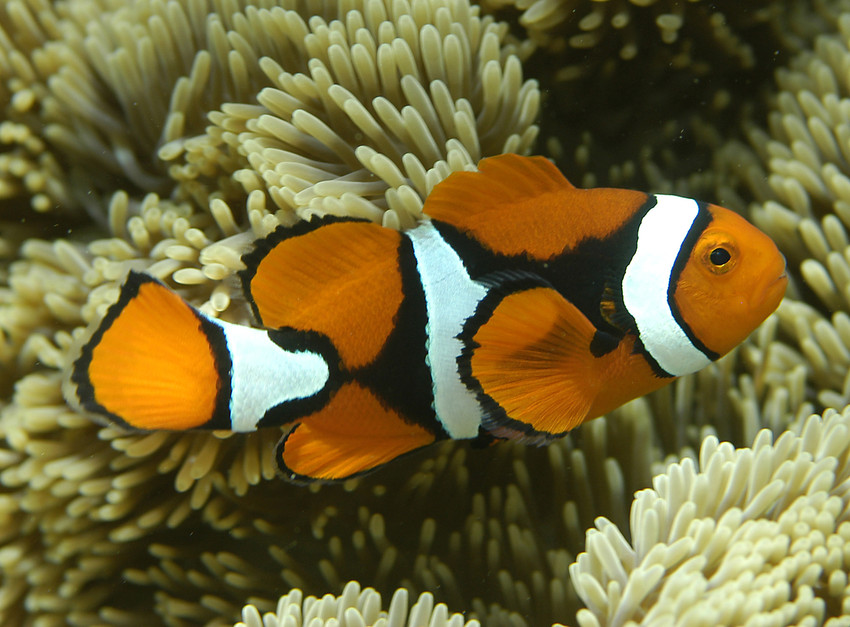
He raked in $17 million at the box office last weekend. As a mom, I can testify that Pixar's Nemo is a kid-pleasing cinematic success. But his real-life counterpart is in terrible trouble.
Unless we face facts and take action, the orange clownfish that inspired Finding Nemo -- along with other species of coral-dependent damselfish -- could face extinction within our lifetimes.
Our tailpipes and smokestacks are taking a deadly toll on coral reefs and the animals, like orange clownfish, that depend on them. As a global society, we pump more than 35 billion tons of carbon dioxide a year into the atmosphere. Much of this man-made carbon pollution stays in the air and contributes to global warming. But one-third ends up in the ocean, where it causes ocean acidification.
Our oceans have become about 30 percent more acidic because of human carbon dioxide emissions, according to scientists. And our troubled waters are also experiencing record-high temperatures. That's bad news for ocean life -- and it's not great for the rest of us, either.
The orange clownfish matters. Losing these little fish and the habitat they depend upon will cost us more than many might imagine. Here are three reasons to protect them from extinction:
1.Dying Coral Reefs Signal Collapsing Ocean Ecosystems.
Any parent with a Nemo-loving child has probably seen the movie enough times to know that clownfish shelter from predators among sea anemones growing on coral reefs. And coral reefs are on the ropes.
Ocean warming is already increasing the frequency and intensity of bleaching events that can kill corals. And scientists predict a dire future. Most of the world's coral reefs will experience severe degradation over the next few decades.
Ocean acidification has already slowed coral growth in some areas. Unless we cut emissions, the oceans could be 150 percent more acidic by 2100, according to a report from the United Nations Environmental Program. 
Scientists warn that coral reefs are likely to be the first worldwide ecosystem to collapse because of these threats. But others may follow.
Corals, after all, are hardly alone in their sensitivity to warming and acidification. Oysters, clams, and other shellfish are also affected - and so are plankton, the base of the ocean food chain. If we don't get our carbon pollution habit under control, we risk irreparable damage to fisheries and natural wonders around the world.
2.Climate change also threatens us.
Held captive in a dentist's aquarium, Nemo and his pals aren't big fans of life on land. But as climate change advances, the rest of us may also start to feel like fish out of water.
The United States just wrapped up its hottest eight months on record. Worldwide, August was the 330th consecutive month with a temperature hotter than the 20th century average, according to the National Oceanic and Atmospheric Administration. Our last normal-temperature month occurred in 1984, when Wham was burning up the pop charts and The A-Team was one of the hottest shows on TV.
Our warming climate is yielding more extreme weather. For Americans, drought has been the most dramatic consequence. This summer's devastating dry spell led the federal government to designate more than half the counties in the United States as primary disaster areas. Food prices went up, and farmers went out of business.
But there's worse to come: Such levels of drought are likely to become normal in the region by the end of the century. And you can't eat carbon pollution.
3.Biodiversity matters for its own sake.
Our kids love Finding Nemo -- and not just because of the amazing animation, punny dialogue, and talented voice actors. They watch the movie again and again -- and again! -- because it opens a window onto a whole new world. There are creatures under the sea that they hadn't begun to imagine.
From the oceans' depths to the North Pole, our planet teems with wonders. But that amazing biodiversity is buckling. More than a third of Earth's animal and plant species will be on the road to extinction by mid-century, if we don't get a handle on climate change. Wildlife just can't adapt quickly enough to deal with the rapid changes caused by manmade global warming.
The Great Barrier Reef, which orange clownfish call home, is the largest single structure made by living organisms. You can see it from space. And it could be destroyed as we know it by 2050 or even sooner -- eroded into rubble by global warming and ocean acidification.
That's not the world I want to leave to my children.
Time's up. We need to take take immediate action against climate change. Because these species matter for their own sake. And because the planet will be a lonelier place without them.
Photo credit: G.R. Allen